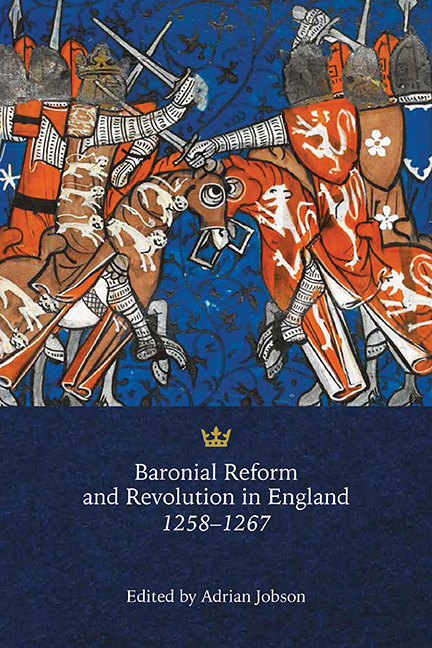Book contents
- Frontmatter
- Dedication
- Contents
- List of Illustrations
- Acknowledgements
- List of Abbreviations
- Introduction
- Modern Historians and the Period of Reform and Rebellion, 1258–1265
- The Secret Revolution of 1258
- Baronial Reform, the Justiciar’s Court and Commercial Legislation: The Case of Grimsby
- Crisis Management: Baronial Reform at the Exchequer
- Local Administration during the Period of Reform and Rebellion
- What Happened in 1261?
- Writing Reform and Rebellion
- Civic Government in Troubled Times: London c.1263–1270
- The Montfortian Bishops
- Reformers and Royalists: Aristocratic Women in Politics, 1258–1267
- The Midlands Knights and the Barons’ War: The Warwickshire Evidence
- Retinues, Agents and Garrisons during the Barons’ Wars
- The Barons’ War in the North of England, 1264–1265
- The Maritime Theatre, 1258–1267
- Reasserting Medieval Kingship: King Henry III and the Dictum of Kenilworth
- Index
The Montfortian Bishops
Published online by Cambridge University Press: 21 May 2021
- Frontmatter
- Dedication
- Contents
- List of Illustrations
- Acknowledgements
- List of Abbreviations
- Introduction
- Modern Historians and the Period of Reform and Rebellion, 1258–1265
- The Secret Revolution of 1258
- Baronial Reform, the Justiciar’s Court and Commercial Legislation: The Case of Grimsby
- Crisis Management: Baronial Reform at the Exchequer
- Local Administration during the Period of Reform and Rebellion
- What Happened in 1261?
- Writing Reform and Rebellion
- Civic Government in Troubled Times: London c.1263–1270
- The Montfortian Bishops
- Reformers and Royalists: Aristocratic Women in Politics, 1258–1267
- The Midlands Knights and the Barons’ War: The Warwickshire Evidence
- Retinues, Agents and Garrisons during the Barons’ Wars
- The Barons’ War in the North of England, 1264–1265
- The Maritime Theatre, 1258–1267
- Reasserting Medieval Kingship: King Henry III and the Dictum of Kenilworth
- Index
Summary
On 12 May 1264, Stephen of Bersted, bishop of Chichester, set off to meet with the leaders of the royal army gathered in Lewes. Sent by Simon de Montfort, whose heavily outnumbered forces were mustered ten miles north at Fletching, the bishop was to offer terms of peace. He laid the earl of Leicester's compromise before the royal party:
Choose the best men, whose faith is lively, who have read canon law, or have becomingly taught theology, and sacred philosophy, and who know how to rule the Christian faith; and whatever such men shall not fear through wholesome doctrine to counsel, or whatever they shall not fear to decide, what they shall say, that shall they find us ready to adopt; in such manner that we may not know the brand of perjury, but as sons of God may hold faith.
Montfort's proposal was at once shrewd and audacious. His willingness to submit to the arbitration of prelates acknowledged the traditional role that bishops played in the political community of medieval England as both peacemakers and overseers of government policy. It was the bishops who were held to guide the king's conscience, who reprimanded him when he transgressed and who enforced Magna Carta, which bound the king to act within the law. The earl's offer thus presented Montfort as a paragon of piety and humility. Yet it was also transparently self-interested. As the royal party knew well, such learned churchmen could be found all too easily at Lewes, because they – like Bersted – had turned out to support Montfort. The earl knew, then, that there was little danger of the royal party accepting his proposal. The offer was made to advertise the support at his command and so declare his righteousness.
Montfort's eagerness to utilise the ecclesiastical arm of his support base is understandable. In a conflict that shook the ideological foundations of medieval politics, the support of senior churchmen was a valuable prize. They gave counsel, helped to operate government, supplied financial aid, constructed arguments to justify the regime to its critics and, overall, invested the movement with a degree of moral authority that it would otherwise have lacked. There were five bishops who were recognised as the most committed supporters of Montfort's regime and who, in 1266, were suspended from office by Pope Clement IV for their involvement.
- Type
- Chapter
- Information
- Baronial Reform and Revolution in England, 1258-1267 , pp. 139 - 151Publisher: Boydell & BrewerPrint publication year: 2016



